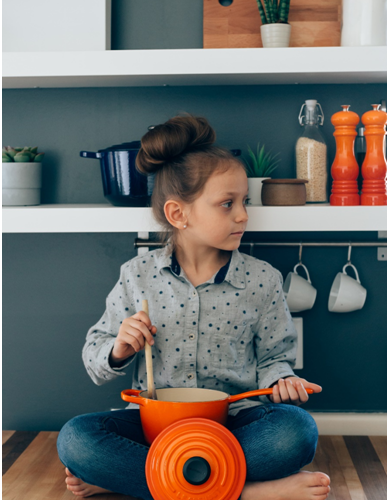How to Create a Cooking Challenge for Kids
Parents usually forbid children to be near the kitchen. Worried that his child is injured or something happened. Even though there are safe ways to teach children to cook.

“Mom, please make a snack, I’m hungry,” said Nadia to her mother, who was busy with office work while working from home.
Nadia is no longer a child who has to be continuously served. If only she wanted to study, Nadia could have made her snacks.
Nadia’s experience could happen to other kids, and just some parents teach his children how to cook in the kitchen. The reason is, worrying about the dangers that might be experienced. According to the US Academy of Nutrition and Dietetics, at the age of 10, children should have mastered simple cooking skills.
The simple cooking skills referred to, among others
- Cleaning and peeling food ingredients cleanly,
- Sorting and slicing vegetables,
- Measure the dosage of dry and liquid ingredients,
- Beating eggs and cake dough,
- Boil pasta, eggs, or vegetables,
- Best Cooking oil
- Make soup, omelet, rice, or toast
- Use kitchen utensils, such as a food processor, blender, mixer, rice cooker, or microwave.
- Teach from the easiest
Many parents only have weekend time to accompanying kids in the kitchen, but it doesn’t mean that weekdays is not a good time to cook. Start with the easiest ones, for example, just cooking rice using a rice cooker. Teach children how to wash rice, measure water in a rice cooker, and use a rice cooker as a kitchen utensil.

After the baby can cook rice, parents can teach them how to make side dishes or snacks. For children at Nadia’s age, using a rice cooker or microwave is relatively safe and comfortable because you don’t have to light a stove where the fire can be dangerous.
The best part is that these two devices can be used for all kinds of cooking. It’s no secret that rice cookers are the mainstay of boarding houses for cuisine. Besides cooking rice, rice cookers can be used to cook vegetables, noodle soup, and various side dishes. Pancakes and cakes can be cooked using this one device.
Along with increasing age and skills, parents can slowly teach children to use the stove when cooking. Teach some simple recipes that children can apply when cooking their favorite foods. Help them cook on the stove. If they are sure of their ability to use kitchen utensils, including using knives, parents can release them to cook independently.
Important thing
Use of cooking utensils
For example, how to operate the stove correctly so that the fire is right for each dish and cooking utensils.
Maintenance of cookware
All cooking utensils must be in clean and well-maintained condition. Teach him how to do it in as much detail as possible. Just say that well-maintained items will last longer and not cause problems.
Provide correct cooking guidelines
Give an example. For example, he only helps prepare the ingredients in the beginning, but it is obligatory to see how you cook. Furthermore, you are the one who mixes all the elements, including the seasonings; he is the one who does the cooking process. If you believe he can, then you can let go completely. When he’s good enough, allow him to improvise. Who knows, he can make different delicious dishes, you know. Also, provide everyday cookbooks that are easy to follow.
…




 …
…